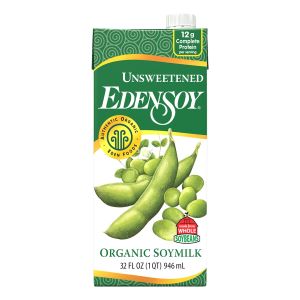Higher Protein Plant Milks
There are times when people’s protein needs are higher. For example, in pregnancy, the recommendation for protein is 25 grams higher than it is when someone is not pregnant. That’s an increase of about 50%. Older adults may have higher protein needs than younger adults. Athletes may have somewhat higher protein needs than non-athletes (1). It’s entirely possible to meet protein needs with a vegan diet. Sometimes, choosing a higher protein plant milk can help to meet protein needs.
We’ve identified some higher protein plant milks. Since plant milks are often also used as a source of calcium, vitamin D, and vitamin B12, we’ve included information about whether the milks we identified are fortified with these nutrients.
West Life Smoothie Blend plain unsweetened and chocolate provide 16 grams of protein per cup. Fortified with calcium (320-330 mg/cup), vitamin D (4.3-4.4 mcg/cup), and vitamin B12 (1.1 mcg/cup).
Edensoy unsweetened organic provides 12 grams of protein per cup of milk. Fortified with calcium (40 mg/cup) but not with vitamin D or vitamin B12.
Pacific Foods Ultra Soy has 10 grams of protein in a cup. Fortified with calcium (280 mg/cup), vitamin D (2.5 mcg/cup), and vitamin B12 (1.5 mcg/cup).
Edensoy Extra Original provides 10 grams of protein per cup. Fortified with calcium (280 mg/cup), vitamin D (1.1 mcg/cup), and vitamin B12 (2.9 mcg/cup).
Silk Protein original and chocolate adds pea protein to a blend of almond milk and cashew milk and has 10 grams of protein in a cup. Fortified with calcium (450 mg/cup) and vitamin D (2.5 mcg/cup). Does not provide vitamin B12.
Orgain Protein Almondmilk lightly sweetened vanilla and unsweetened vanilla adds pea protein and has 10 grams of protein in 1 cup. Fortified with calcium (250 mg/cup) and vitamin D (2.5 mcg/cup). Does not provide vitamin B12.
Edensoy original organic provides 10 grams of protein per cup of milk. Fortified with calcium (90 mg/cup) but not with vitamin D or vitamin B12.
Pacific Foods organic unsweetened soymilk has 9 grams of protein in a cup. It is not fortified with calcium, vitamin D or vitamin B12.
West Life organic unsweetened plain and organic unsweetened vanilla provide 9 grams of protein per cup. Organic plain soymilk has 8 grams of protein in a cup. None of these products are fortified with calcium, vitamin D or vitamin B12.
Good Karma Flaxmilk + Protein, shelf-stable, vanilla adds pea protein to flaxmilk has 8 grams of protein in 1 cup. Fortified with calcium (320 mg/cup), vitamin D (2.3 mcg/cup) and vitamin B12 (1.4 mcg/cup). Other Good Karma products, even those with added protein, only have 5 grams of protein in a cup.
Ripple Kids original and unsweetened is based on pea protein and has 8 grams of protein in a cup. Fortified with calcium (455 mg/cup), vitamin D (6 mcg/cup), and vitamin B12 (1.1 mcg/cup).
Ripple also makes a pea protein-based milk for adults that has 8 grams of protein in a cup. It is available in original, unsweetened original, vanilla, unsweetened vanilla, and chocolate flavors and in refrigerated and shelf-stable cartons. Fortified with calcium (440 mg/cup), vitamin D (5-6 mcg/cup), and vitamin B12 (1.1-2.5 mcg/cup). Fortification varies between refrigerated and shelf-stable products.
West Life organic plain or vanilla soymilk with calcium and vitamin D has 8 grams of protein per cup. Fortified with calcium (300-310 mg/cup), vitamin D (4.8 mcg/cup), and vitamin B12 (1.1 mcg/cup).
Edensoy cocoa organic provides 8 grams of protein per cup of milk. Fortified with calcium (90 mg/cup) but not with vitamin D or vitamin B12.
Reference
- Larson-Meyer DE, Ruscigno M. Plant-Based Sports Nutrition. Expert Fueling Strategies for Training, Recovery, and Performance. Champaign, IL: Human Kinetics; 2020.
We often depend on product and ingredient information from company statements. It is impossible to be 100% sure about a statement, information can change, people have different views, and mistakes can be made. Please use your best judgment about whether a product is suitable for you. To be sure, do further research or confirmation on your own.
Thanks to Debra Wasserman for gathering some information that was used in this article.
To read more about plant milks see:
VRG Sends in Testimony to FDA on Labeling of Plant-based Milk Alternatives
Choosing a Plant Milk? Check the Nutrition Facts Label
Does Your Favorite Plant Milk Provide Vitamin B12?
Non-dairy Milks: Nutrients of Importance in Chronic Kidney Dysfunction

